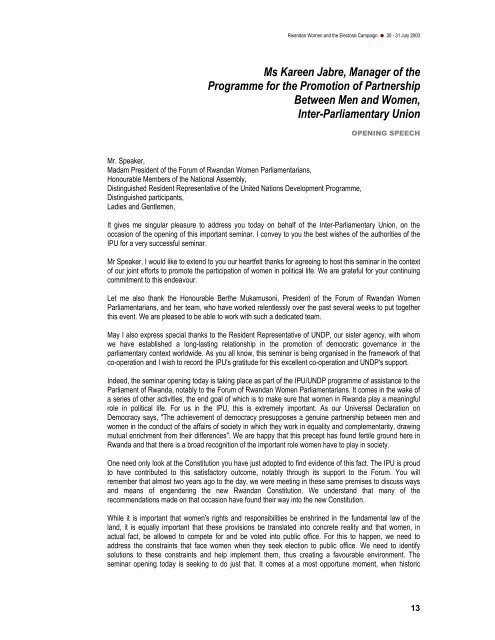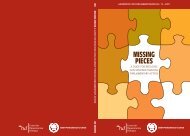Les femmes rwandaises et la campagne électorale - Inter ...
Les femmes rwandaises et la campagne électorale - Inter ...
Les femmes rwandaises et la campagne électorale - Inter ...
Create successful ePaper yourself
Turn your PDF publications into a flip-book with our unique Google optimized e-Paper software.
Rwandan Women and the Electoral Campaign • 30 - 31 July 2003<br />
Ms Kareen Jabre, Manager of the<br />
Programme for the Promotion of Partnership<br />
B<strong>et</strong>ween Men and Women,<br />
<strong>Inter</strong>-Parliamentary Union<br />
OPENING SPEECH<br />
Mr. Speaker,<br />
Madam President of the Forum of Rwandan Women Parliamentarians,<br />
Honourable Members of the National Assembly,<br />
Distinguished Resident Representative of the United Nations Development Programme,<br />
Distinguished participants,<br />
Ladies and Gentlemen,<br />
It gives me singu<strong>la</strong>r pleasure to address you today on behalf of the <strong>Inter</strong>-Parliamentary Union, on the<br />
occasion of the opening of this important seminar. I convey to you the best wishes of the authorities of the<br />
IPU for a very successful seminar.<br />
Mr Speaker, I would like to extend to you our heartfelt thanks for agreeing to host this seminar in the context<br />
of our joint efforts to promote the participation of women in political life. We are grateful for your continuing<br />
commitment to this endeavour.<br />
L<strong>et</strong> me also thank the Honourable Berthe Mukamusoni, President of the Forum of Rwandan Women<br />
Parliamentarians, and her team, who have worked relentlessly over the past several weeks to put tog<strong>et</strong>her<br />
this event. We are pleased to be able to work with such a dedicated team.<br />
May I also express special thanks to the Resident Representative of UNDP, our sister agency, with whom<br />
we have established a long-<strong>la</strong>sting re<strong>la</strong>tionship in the promotion of democratic governance in the<br />
parliamentary context worldwide. As you all know, this seminar is being organised in the framework of that<br />
co-operation and I wish to record the IPU's gratitude for this excellent co-operation and UNDP's support.<br />
Indeed, the seminar opening today is taking p<strong>la</strong>ce as part of the IPU/UNDP programme of assistance to the<br />
Parliament of Rwanda, notably to the Forum of Rwandan Women Parliamentarians. It comes in the wake of<br />
a series of other activities, the end goal of which is to make sure that women in Rwanda p<strong>la</strong>y a meaningful<br />
role in political life. For us in the IPU, this is extremely important. As our Universal Dec<strong>la</strong>ration on<br />
Democracy says, "The achievement of democracy presupposes a genuine partnership b<strong>et</strong>ween men and<br />
women in the conduct of the affairs of soci<strong>et</strong>y in which they work in equality and complementarity, drawing<br />
mutual enrichment from their differences". We are happy that this precept has found fertile ground here in<br />
Rwanda and that there is a broad recognition of the important role women have to p<strong>la</strong>y in soci<strong>et</strong>y.<br />
One need only look at the Constitution you have just adopted to find evidence of this fact. The IPU is proud<br />
to have contributed to this satisfactory outcome, notably through its support to the Forum. You will<br />
remember that almost two years ago to the day, we were me<strong>et</strong>ing in these same premises to discuss ways<br />
and means of engendering the new Rwandan Constitution. We understand that many of the<br />
recommendations made on that occasion have found their way into the new Constitution.<br />
While it is important that women's rights and responsibilities be enshrined in the fundamental <strong>la</strong>w of the<br />
<strong>la</strong>nd, it is equally important that these provisions be trans<strong>la</strong>ted into concr<strong>et</strong>e reality and that women, in<br />
actual fact, be allowed to comp<strong>et</strong>e for and be voted into public office. For this to happen, we need to<br />
address the constraints that face women when they seek election to public office. We need to identify<br />
solutions to these constraints and help implement them, thus creating a favourable environment. The<br />
seminar opening today is seeking to do just that. It comes at a most opportune moment, when historic<br />
13

















